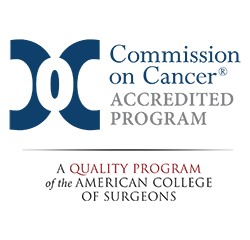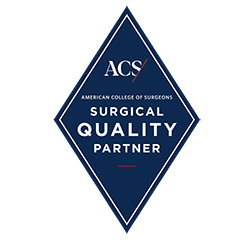Symptoms & Diagnosis
You may be at risk of stomach cancer if you’ve had previous H. pylori infections or stomach inflammation. A diet high in salted, smoked or pickled foods, a history of smoking or a family history of stomach cancer can also increase your risk.
Stomach cancer can feel like or lead to:
- Early on, indigestion and stomach discomfort
- Blood in the stool
- Jaundice (yellowish skin tone)
- Trouble swallowing
- Unexplained weight loss
Early symptoms of stomach cancer can be confused with other stomach conditions, but you know your body better than anyone. If you think you are feeling any stomach cancer symptoms, reach out to your doctor so we can learn more about what might be causing them.
We use a range of tests to diagnose stomach cancer, including:
- Blood and fecal occult blood tests to detect blood in the stool
- Upper endoscopy to look at the stomach and take a tissue sample (biopsy) for further study
- Barium swallow test to examine the structure and function of the digestive tract
- Endoscopic ultrasound to look inside the stomach
If these exams are abnormal, we refer you for a cancer consultation with an oncologist with expertise in gastrointestinal conditions and who specializes in treating stomach cancer. This expert reviews your test results and medical history to learn more about your diagnosis and form a treatment plan tailored to your needs.
We know learning you have stomach cancer can feel scary. That’s why we are committed to seeing you for a cancer consultation as quickly as possible — often within 48 hours — after your diagnosis so we can discuss treatment options, order additional tests and address any questions without delay.
Treatments
You deserve a personalized care plan tailored to your needs and the state of your stomach cancer. Each week, the Cancer Care team convenes a tumor board that brings together experts from across disciplines to collaborate on customized care plans for you. This collaboration has one common goal — to make sure you get the best possible care. Our multidisciplinary team of specialists, including surgical, medical and radiation oncologists who collaborate with gastroenterologists, interventional gastroenterologists, radiologists and pathologists, is here to care for you through every part of your treatment.
Surgery
Radiation
Your cancer care team may recommend external-beam radiation treatment to treat your stomach cancer. Radiation oncologists at our Radiation Treatment Center have treated thousands of patients, and our state-of-the-art radiation treatments, including stereotactic radiosurgery, adaptive radiation therapy, intensity-modulated radiation therapy and 4D localization system radiation therapy, treat stomach cancer with great precision which allows higher radiation doses in fewer sessions than traditional radiation therapy.
Chemotherapy
Chemotherapy is often used to treat stomach cancer. We work with you to determine if chemotherapy is a good option for your stomach cancer and collaborate on the right combination of anticancer drugs, anti-nausea medicine and pain medication for your needs. Targeted drugs can also be an effective treatment for stomach cancer and El Camino Health is at the forefront of hospitals using this treatment. We analyze your cancer to learn its protein and chemical makeup, then determine which drugs will have the maximum effect in fighting it.
Clinical Trials
We’re always on the hunt for the next opportunity to improve detection, ease treatment and find better cures for your stomach cancer. That’s why we collaborate with other medical centers and the National Cancer Institute on stomach cancer clinical trials ranging from innovative radiotherapy to immunotherapy and more.
If you’re interested in participating in this leading-edge research, talk to your care team to find a study that’s right for you.
Cancer Awards & Accreditations
Our superior Cancer Care has earned us a three-year accreditation as a comprehensive community cancer program from the Commission on Cancer of the American College of Surgeons (ACS). Accreditation ensures that the care you receive right here in your community is high-quality and uses evidence-based, national treatment guidelines.
We’re also an ACS Surgical Quality Partner and committed to the highest surgery standards.
Patients rate us highly, too. Based on PressGaney patient satisfaction surveys, our “likeliness to recommend” score is over 90%, and we’ve won the top patient experience award multiple years in a row.
 |  |
Cancer Patient Stories
You are our inspiration. Hear how El Camino Health Cancer Care has helped other patients beat cancer — and how we can support you at every step of the way.


